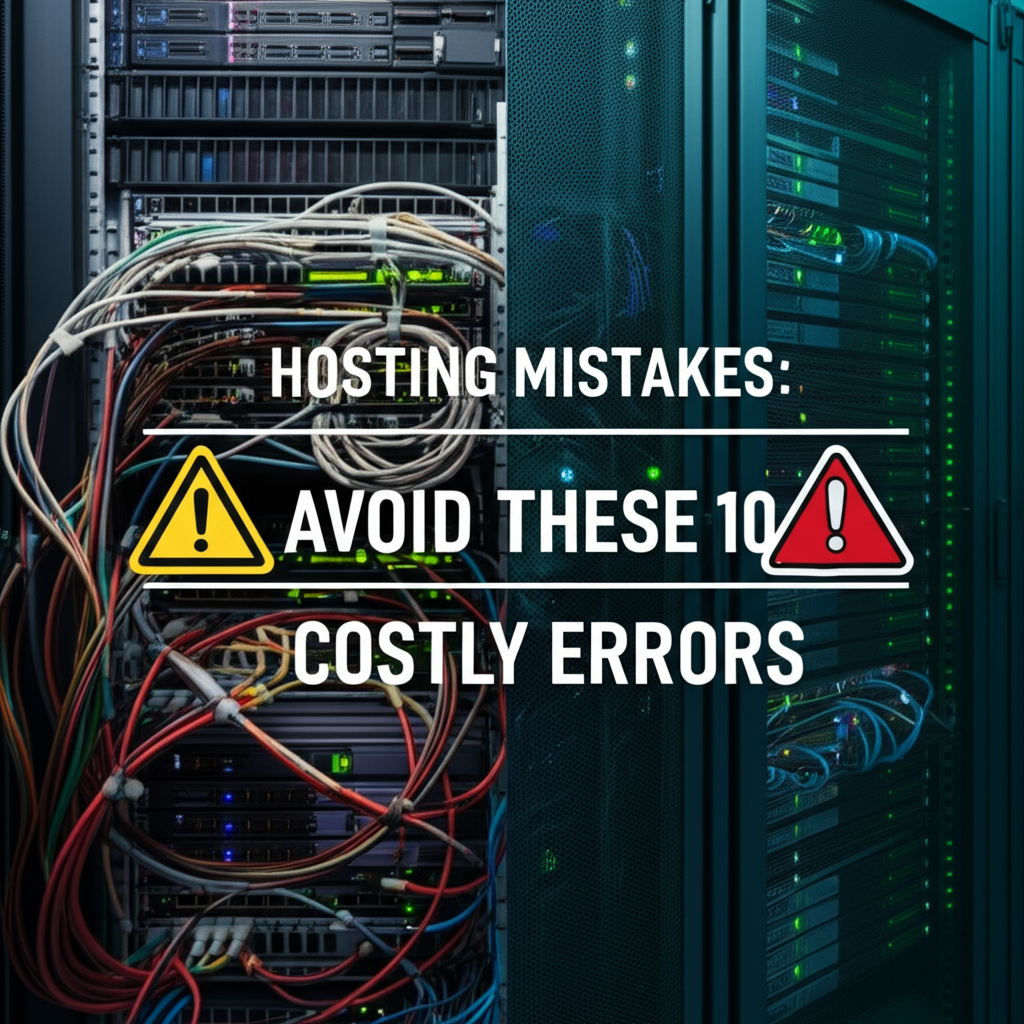- Common Hosting Mistakes: Choosing the Wrong Plan
- Hosting Mistakes Related to Security
- Neglecting Security Updates
- Ignoring SSL Certificates
- Performance-Impacting Hosting Mistakes
- Overlooking Caching
- Not Optimizing Images
- Other Critical Hosting Mistakes to Avoid
- Ignoring Backups
- Poor Choice of Data Center Location
- Not Monitoring Website Performance
- Neglecting Customer Support
- Failing to Plan for Scalability
Hosting Mistakes: Avoid These 10 Costly Errors
Hosting mistakes can turn your online dreams into a nightmare. Choosing the wrong hosting plan, neglecting security, or overlooking performance optimization can lead to downtime, lost revenue, and a damaged reputation. This article outlines ten common hosting mistakes and provides actionable advice to help you avoid them.
Common Hosting Mistakes: Choosing the Wrong Plan

One of the most fundamental hosting mistakes is selecting an unsuitable hosting plan. Opting for the cheapest shared hosting plan might seem attractive initially, but it can quickly become a bottleneck as your website grows. Shared hosting resources are limited, meaning your site’s performance could suffer if another site on the same server experiences a traffic surge. Consider your website’s traffic projections, resource requirements, and scalability needs when choosing between shared, VPS, dedicated, or cloud hosting. Investing in a slightly more expensive plan that accommodates your future growth can save you from headaches down the line.
Hosting Mistakes Related to Security
Neglecting Security Updates
Failing to keep your hosting environment and software updated is a major security risk. Outdated software often contains vulnerabilities that hackers can exploit to gain access to your website’s data. Ensure your hosting provider offers automatic updates or diligently apply updates yourself as soon as they are released. This includes updating your content management system (CMS), plugins, themes, and any other software running on your server.
Ignoring SSL Certificates
In today’s digital landscape, an SSL certificate is not optional. It encrypts the data transmitted between your website and your visitors’ browsers, protecting sensitive information like passwords and credit card details. Not having an SSL certificate can damage your credibility, negatively impact your search engine rankings, and leave your site vulnerable to attacks. Most reputable hosting providers offer free SSL certificates through Let’s Encrypt, making it easy to secure your website.
Performance-Impacting Hosting Mistakes
Overlooking Caching
Caching significantly improves website speed by storing frequently accessed data in a temporary storage location. This reduces the load on your server and allows your website to load faster for returning visitors. Leverage browser caching, server-side caching, and content delivery networks (CDNs) to optimize your website’s performance.
Not Optimizing Images
Large, unoptimized images can drastically slow down your website’s loading speed. Compressing your images before uploading them and using appropriate image formats (like WebP) can significantly reduce file sizes without sacrificing visual quality. Consider using image optimization plugins or online tools to streamline this process.
Other Critical Hosting Mistakes to Avoid
Ignoring Backups
Data loss can be devastating. Regular backups are crucial for protecting your website’s content, databases, and configurations. Ensure your hosting provider offers automated backups or implement your own backup solution. Regularly test your backups to ensure they are working correctly and that you can restore your website in case of an emergency.
Poor Choice of Data Center Location
The physical location of your server impacts your website’s loading speed for visitors in different geographical regions. Choosing a data center closer to your target audience can significantly improve their browsing experience. If you have a global audience, consider using a CDN to distribute your content across multiple servers worldwide.
Not Monitoring Website Performance
Regularly monitoring your website’s performance helps you identify potential issues before they escalate. Utilize website monitoring tools to track uptime, loading speed, and resource usage. This allows you to proactively address any problems and maintain optimal performance.
Neglecting Customer Support
Reliable customer support is essential when encountering technical difficulties. Before choosing a hosting provider, research their customer support options and read reviews to gauge their responsiveness and helpfulness. A good hosting provider should offer 24/7 support through various channels like phone, email, and live chat.
Failing to Plan for Scalability
Your website’s traffic and resource requirements will likely change over time. Choosing a hosting provider that offers scalable solutions is essential for accommodating future growth. Whether it’s upgrading to a more powerful server or migrating to a different hosting environment, ensure your hosting provider can support your evolving needs.
By understanding these common hosting mistakes and taking proactive steps to avoid them, you can ensure your website runs smoothly, securely, and efficiently. Investing time and effort in choosing the right hosting solution and implementing best practices will pay dividends in the long run, contributing to your online success.











Leave a Reply